(Reuters) – Frontier Group, the parent of budget carrier Frontier Airlines, reported a bigger-than-expected loss in the third quarter on Tuesday, as overcapacity on domestic routes hit its revenue in the first half of the period.
Shares of the carrier were down about 3% in early trading.
An excess supply of airline seats in the domestic market during initial phases of the U.S. summer travel season had forced carriers to offer discounts to fill their planes.
The situation of oversupply and subsequent discounting placed additional strain on ultra-low-cost carriers such as Frontier as they grappled with stiff competition from their larger counterparts.
Airlines, however, have moderated capacity since then. Frontier said its adjusted revenue per available seat mile (RASM) was higher in the second half of the quarter.
Its adjusted RASM, a proxy for pricing power, fell 5% in the quarter over the year earlier.
Frontier reported an adjusted loss of 5 cents per share, compared with analysts’ average estimate of a 3-cent loss, according to data compiled by LSEG.
The ultra-low-cost business model has remained challenged since the pandemic because of excessive labor, aircraft maintenance and other operating costs.
No-frills carriers such as Frontier have been on the lookout to find high-margin revenue streams to offset ballooning expenses, forcing them to move away from their traditional business models to woo customers who are willing to pay more for better travel experiences.
Frontier’s total operating revenue was at $935 million, compared with Wall Street expectations of $942.1 million.





